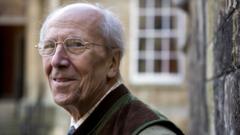Is Norman Tebbit the Unwavering Hero of the Conservative Right?

Norman Tebbit: A Life in Politics and Ideology
Norman Tebbit, who passed away at the impressive age of 94, was a defining figure during Margaret Thatcher's political revolution in the United Kingdom. His life story is one of resilience, conviction, and unwavering belief in self-reliance, which formed the bedrock of his political philosophy. From humble beginnings in a working-class suburb of London to becoming a high-ranking politician and a voice for the Conservative Party, Tebbit’s trajectory was marked by significant events and ideologies that shaped British politics in the late 20th century.
This article delves into the life and legacy of Norman Tebbit, exploring his political career, core beliefs, and the impact he had on the Conservative Party and the broader political landscape of Britain.
Early Life and Background
Born on March 29, 1931, in Ponders End, North London, Norman Beresford Tebbit was raised in a family that experienced both modest success and economic hardship. His father, who managed a jewellery and pawnbroker's business, initially provided a stable environment for the family. However, the Great Depression forced them into a series of short-term rentals in Edmonton, significantly altering their lifestyle.
Tebbit’s early exposure to hardship undoubtedly shaped his views on self-reliance and personal responsibility. He attended Edmonton County Grammar School, where he developed a keen interest in Conservative politics. He famously stated, "I felt you should be able to make your own fortune. You should be master of your own fate," reflecting the individualistic philosophy that would guide his political career.
Career Beginnings
At just 16, Tebbit began his career at the Financial Times, but a compulsory union membership frustrated him. After two years, he enlisted in the Royal Air Force for National Service, where he earned a commission as a Pilot Officer. However, recognizing that his aspirations in politics were incompatible with a military career, he transitioned to a private sector job in advertising.
Despite leaving active service, Tebbit maintained his passion for flying by joining the Royal Auxiliary Air Force. A harrowing incident in which he nearly died during a plane crash left a lasting impact on him, as he narrowly escaped from a burning Meteor jet. This close call was just one of many challenges that would define his life.
A Political Awakening
In 1953, Tebbit joined British Overseas Airways Corporation (BOAC) as a pilot, balancing this career with political activism for the British Airline Pilots' Association. His growing discontent with Labour’s policies led him to seek a political role. In 1964, he was selected as the Conservative Party candidate for Epping, a seat once held by Winston Churchill. His energetic campaigning and robust speeches advocated for selling off state-owned industries, immigration control, and a critique of the permissive society.
Becoming a Member of Parliament
In 1970, Tebbit won the Epping seat, marking the beginning of his political ascent. However, he quickly became disillusioned with then-Prime Minister Ted Heath's leadership, feeling that the radical platform which had secured their electoral victory was being sidelined in favor of a more consensus-driven approach.
Despite his frustrations, he accepted a role as parliamentary private secretary to the minister of state for employment. His tenure was short-lived, as he resigned in protest against Heath's policies on prices and incomes, which he viewed as a betrayal of Conservative principles. After the Conservatives lost power, he continued to make his mark as a vocal critic from the backbenches, earning a reputation as a thorn in the side of Labour ministers.
Rise to Prominence Under Thatcher
With Margaret Thatcher’s ascension to leadership in 1975, Tebbit found an ally who shared his vision for the Conservative Party. Appointed as under-secretary of state at the Department of Trade, he quickly rose to the role of Employment Secretary, signaling a shift towards a tougher stance on industrial relations.
One of Tebbit's most memorable moments came during the 1981 Conservative Party conference. Amidst rising unemployment and civil unrest, he famously remarked that during his father's unemployment in the 1930s, he did not riot but "got on his bike and looked for work." This remark became a focal point of controversy, as critics interpreted it as an insensitive dismissal of the struggles faced by the unemployed.
Legislative Achievements
Tebbit's 1982 Employment Act was a significant legislative achievement. It raised compensation for workers dismissed for refusing to join a union and mandated regular ballots on closed shop agreements. His focus on trade unions and industrial relations positioned him as a crucial figure in Thatcher's government, and he later described this legislation as "my finest achievement in government."
Trade and Industry Secretary
In 1983, following the resignation of Cecil Parkinson, Tebbit became the Secretary of State for Trade and Industry. His tenure coincided with Thatcher's ambitious privatization program, where he played a pivotal role in encouraging foreign investment in the UK, including the establishment of the Nissan car plant in Sunderland.
However, his life took a tragic turn during the 1984 Conservative Party conference when the IRA bombed the Grand Hotel in Brighton, killing five and injuring over thirty. Tebbit and his wife, Margaret, were trapped in the debris for hours, leading to serious injuries for both. While he recovered relatively quickly, Margaret faced long-term health challenges, including paralysis, which altered their lives dramatically.
Conservative Party Chairman and Controversies
After the 1987 election, which resulted in a Conservative landslide, Tebbit became the party chairman, tasked with revitalizing a party that was beginning to lose its luster. He launched a membership drive and attempted to prepare the party for future electoral battles. However, internal dynamics began to shift as Thatcher's popularity waned, leading to speculation about potential successors.
In 1990, he made headlines again when he suggested that ethnic minorities' willingness to assimilate could be gauged by their support for the England cricket team over their country of origin’s team. This statement stirred controversy and highlighted Tebbit's confrontational style and uncompromising views on immigration and integration.
Life as a Peer and Continued Influence
Following his decision not to seek re-election in 1992, Tebbit was made a life peer as Baron Tebbit of Chingford. Despite stepping away from the forefront of active politics, he continued to influence Conservative Party policy from the House of Lords. He was particularly vocal about Europe and criticized the signing of the Maastricht Treaty, which he argued diluted the sovereignty of the UK.
His criticisms did not stop there; he also lamented the Conservative Party's shift towards a more centrist position, suggesting it led to the rise of UKIP and weakened the party's traditional base. Tebbit remained an ardent supporter of Brexit, expressing frustration with the government’s negotiations with the European Union under Prime Minister Theresa May.
Legacy and Final Years
In 2020, Tebbit faced personal tragedy with the passing of his wife Margaret, following a prolonged battle with Lewy Body Dementia. He continued to make public appearances until his final days in the House of Lords in 2022, marking the end of a remarkable 52-year parliamentary career.
Norman Tebbit’s legacy as a staunch advocate of the Conservative Party’s hardline approach to immigration, trade unions, and economic policies is undeniable. His influence during the Thatcher years and beyond shaped the direction of the party and provided a voice for the more traditional Conservative electorate.
Conclusion: A Complex Political Figure
Norman Tebbit's life was a tapestry woven with personal resilience, political conviction, and a commitment to the principles of self-reliance and individual responsibility. His straightforward and often controversial views endeared him to many within the Conservative Party while simultaneously alienating others. As a figure who embodied the spirit of Thatcherism, he was often seen as the "public face" of the ideology, championing the cause of the working-class Conservative voter.
As we reflect on the life and legacy of Norman Tebbit, it raises important questions about the future of the Conservative Party and the direction it will take in an ever-changing political landscape. How will the party reconcile its traditional values with the modern needs of its constituents? What lessons can be drawn from Tebbit's uncompromising approach to politics?
FAQs
What were Norman Tebbit's main political beliefs?
Norman Tebbit believed in self-reliance, economic liberalism, and a tough stance on immigration and trade unions. His philosophy emphasized individual responsibility and the importance of personal initiative.
How did Norman Tebbit impact the Conservative Party?
Tebbit played a crucial role in shaping the Conservative Party's policies during the Thatcher years, advocating for privatization, trade union reforms, and a hardline immigration stance, making him a key figure in the party's ideological transformation.
What was the significance of Tebbit's "get on your bike" speech?
The phrase "get on your bike" became emblematic of Tebbit's views on unemployment, suggesting that individuals should actively seek work rather than resort to protests or riots. This statement sparked significant controversy and debate about the responsibilities of the unemployed.
As we remember Norman Tebbit, we are left to ponder the future of conservative ideology in Britain. How will history judge his policies and their impact on society? #NormanTebbit #ConservativePolitics #PoliticalLegacy
Published: 2025-07-08 08:24:04 | Category: sport



